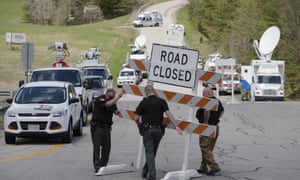
Residents of the rural southern Ohio community of Piketon are rattled by a rare major crime that took the lives of eight members of a tight-knit family known in the area as hard workers.
Authorities were still trying Sunday to find out who targeted the seven adults and teenage boy and why. Their bodies were found Friday at four different homes near Piketon, about 60 miles south of Columbus.
Kayla Hay said she got to know one of the victims, 37-year-old Dana Rhoden, when they both worked as nurse’s aides at a nursing home. Hay said she was shocked and saddened when she heard Rhoden was among those killed.
“I’ve never heard her say anything about being frightened or concerned about anything bad happening,” said Hay, who described Rhoden as outgoing and friendly.
“She was always in a good mood and was very bright, both in her personality and her intelligence,” Hay said.
All of the victims were members of the Rhoden family. The others were identified as 40-year-old Christopher Rhoden Sr; his 16-year-old son, Christopher Rhoden Jr; 44-year-old Kenneth Rhoden; 38-year-old Gary Rhoden; 20-year-old Clarence “Frankie” Rhoden; 20-year-old Hannah Gilley and 19-year-old Hanna Rhoden.
It appeared some of the family members were killed as they slept, including Hanna Rhoden, who was in bed with her newborn baby nearby, authorities said. The baby was four or five days old, authorities said. The newborn, Hannah Gilley’s six-month-old baby and one other small child were not hurt.
Authorities said none of the injuries appeared self-inflicted. A search for the killer or killers continued Sunday, and investigators said they had interviewed more than 30 people.
Robin Waddell, who owns the Big Bear Lake family resort just south of Piketon, said Christopher Rhoden often did work for him as a carpenter and helped out with his excavation business. He said Rhoden was a nice guy whose kids sometimes visited him while he was working.
“It’s a large family,” Waddell said. “There’s a lot of them and they’ve been in this community for generations. So this is affecting a lot of people.”
Comments
Post a Comment